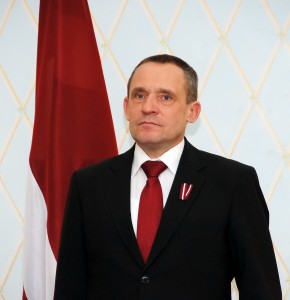ASTANA – Latvian Ambassador to Kazakhstan Juris Maklakovs will wrap up his embassy’s turn as NATO point of contact in Kazakhstan at the end of this year, but the connection between the two countries will remain as Latvia prepares to take over the EU presidency following the signing of a new cooperation agreement between the organisation and Kazakhstan.
Cooperation with Central Asia will be high on the EU agenda in the coming years, Maklakovs told The Astana Times in a recent interview, and Latvia intends to seek ways to increase connections between the regions.
“Next year, Latvia will lead the EU presidency, and one of the priorities during that time will be Central Asia,” he said. “We in Latvia understand the importance of cooperation between the EU and Central Asian countries. Kazakhstan is the biggest country in the region, economically strong and Kazakhstan is developing very, very quickly. It’s a great partner for the EU.”
Kazakhstan and the EU signed a new enhanced Partnership and Cooperation Agreement (PCA) this month, the only second-generation agreement between the EU and a Central Asian state. “For Latvia, as a member of the EU, it’s very important to keep this good cooperation with Central Asia, and so what we are proposing is to review the strategy between the EU and Central Asian countries. We propose to increase our economic and cultural relationship, we propose to discuss security issues, because this is something in common between us in Europe and Central Asia,” Maklakovs said.
The next year will bring more cooperation and discussion between the EU and Central Asia, the ambassador said, because trade, security and cultural exchanges are all interconnected. The New Silk Road initiative, a U.S.-backed project to connect Central Asian countries, Afghanistan and Europe and develop trade and transit connections, an energy market and coordinated border and customs control, will also improve security and raise the living standards of people living near the new “Silk Roads,” the ambassador said. “And it will improve cultural exchange between Europe and Central Asia, Central Asian and Europe. Such cooperation will benefit both sides,” he said.
Serving as the NATO point of contact in Astana from 2013 through 2014, security has obviously been a point of focus for Maklakovs. The main duty of the NATO point of contact, the ambassador said, is public diplomacy. “It means that we are responsible for delivering all the messages of NATO in the specific region.” This delivery comes through lectures at military institutions, conferences and other forms of outreach, and the focus has largely been on Afghanistan and the future of the International Security Assistance Force (ISAF) mission there, Maklakovs, a retired major general and a former commander of the Latvian National Armed Forces, said.
As international troops withdraw from Afghanistan at the end of this year, NATO’s mission there will turn to training and logistical support for Afghan troops. Though Kazakhstan has not sent peacekeeping forces to Afghanistan, the country has supported its regional neighbour with humanitarian, infrastructural and educational aid and consistently expressed its willingness to continue that support.
“Afghanistan needs help and, from my point of view, it’s very important that Central Asian countries understand this need,” the ambassador said. Though that help has not come in the form of troops on the ground, “there’s humanitarian aid and active training of civilians here in this country and in other countries in the region.”
The situation in the Ukraine has made the mission to communicate NATO policy more important and more complicated, the ambassador admits, and he is frequently asked to explain NATO’s position on the ongoing violence there, the situation with Crimea and NATO’s response to the actions of the Islamic State group in Iraq and Syria.
“My personal opinion is yes, there will be more need for the NATO contact point, and not only in Kazakhstan but in different regions, to pay more attention to explaining the decisions taken during the Wales summit [on Sept. 4 and 5].” NATO’s decisions from that summit and the nature of the involvement of NATO countries in Ukraine will require explanation, as will NATO’s position on Kazakhstan’s major partner, Russia.
“Of course, NATO stressed the Russian role in this Ukrainian crisis [during the summit] and NATO understands and sees that Russia is involved in this crisis. This will give more work for NATO point of contact embassies in Kazakhstan,” the ambassador said.
Maklakovs will conclude his mission as ambassador next year, ending a tour that has seen a visit by Latvian President Andris Bērziņš, who signed a number of agreements in education, tourism and the environment in Astana last year, as well as the visits by the mayor of Riga and a number of business delegates.
“We have very good bilateral relations,” the ambassador said. Transit is a major area of cooperation for the two countries, but cooperation on environmental solutions, tourism and cultural exchanges also have a great deal of promise, he said.
Maklakovs’ main goal as ambassador was to enhance Latvia and Kazakhstan’s economic relationship, he said. Trade between Latvia and Kazakhstan for the first half of 2014 was 43.97 million euros, just about half of Latvia’s total trade with Central Asia. Trade has more than doubled between the two countries since 2005, but growth has been less than steady. Exports to Kazakhstan have fallen by roughly one third compared with this period last year; imports have fallen by over a quarter.
Mayor of Riga Nil Ushakov and the Latvian business delegation presented projects relating to environmental protection, trade and tourism at a Kazakh-Latvian business forum in Astana in September. Waste management and water management in Riga and the possibility of selling Latvian speciality items in local grocery stores were among some of the most promising programmes presented, the ambassador said. Mayor Ushakov also opened the Astana Leisure Tourism Exhibition, and several companies from Riga and Jūrmala took part in the exhibition.


